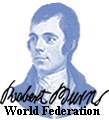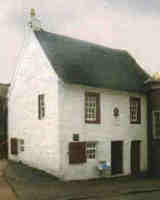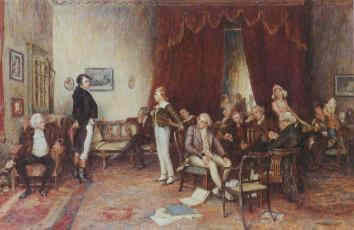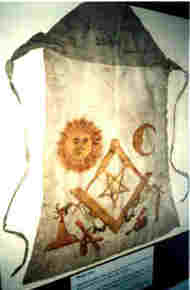


 |
 |
 |
 Burns:-
Irvine, Illness & Inspiration
Burns:-
Irvine, Illness & Inspiration
(Facts 28-30)
BURNS IN IRVINE
28. Robert was in Irvine
from July 1781 till the spring of 1782, learning the craft of flax-dressing.
Two buildings in the Glasgow Vennel vie for the honour of having been the
heckling-shed where he worked. One tradition is that Burns himself knocked
over the candle that burned him out, but Burns himself blamed the wife of
his partner, in a drunken spree at Hogmanay (31 December).

24. Tarbolton Bachelors' Club was founded by Robert Burns on 11th November 1780 with seven companions. The rules, drawn up by Burns, stipulated that "Every man proper for a member of this Society, must have a frank, honest, open heart; above anything dirty or mean; and must be a professed lover of one or more of the female sex".

25. At a time when men of the peasantry cut their hair short, and the upper
classes wore wigs or styled their hair as if they did, Burns "wore the
only tied hair in the parish" according to David Sillar.
THE JILTED LOVER
 26.
Five early letters of Burns, known only as drafts, addressed to 'My dear E.'
or Dear A.' have previously been identified as written to Alison or Ellison
Begbie, daughter of a small farmer in Newmilns Parish and the heroine of 'The
Lass of Cessnock Banks' This identification was supplied by Isabella Burns
in 1850. Recent research shows that she was, in fact, Elizabeth Gebbie, probably
also the heroine of 'Farewell to Eliza', one of Robert's earliest songs. Elizabeth
turned him down in the summer of 1781 and married Hugh Brown, a stocking-maker
who later became one of Glasgow's wealthiest hosiery manufacturers.
26.
Five early letters of Burns, known only as drafts, addressed to 'My dear E.'
or Dear A.' have previously been identified as written to Alison or Ellison
Begbie, daughter of a small farmer in Newmilns Parish and the heroine of 'The
Lass of Cessnock Banks' This identification was supplied by Isabella Burns
in 1850. Recent research shows that she was, in fact, Elizabeth Gebbie, probably
also the heroine of 'Farewell to Eliza', one of Robert's earliest songs. Elizabeth
turned him down in the summer of 1781 and married Hugh Brown, a stocking-maker
who later became one of Glasgow's wealthiest hosiery manufacturers.
FREEMASONRY
27. On 4 July 1781 Burns was initiated as a freemason, in St David's Lodge, Tarbolton, No. 174, and passed and raised on 1 October the same year. He was elected Depute Master of St James's Lodge on 27 July 1784, a position he held till 1788 when he removed to Dumfriesshire. His masonic contacts opened many doors to him when he first went to Edinburgh.
© 2008 The Robert Burns World Federation